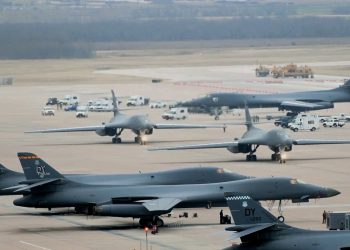US Air Force,
SCOTT AIR FORCE BASE: Air Force senior leaders came together here for a quarterly Process Council meeting to discuss issues facing the service today and in the future.
A highlight of the June 2-3 forum was the review of Air Force Smart Operations for the 21st Century initiatives designed to help provide substantive solutions to difficult challenges in this increasingly complex national security environment.
Major elements of the Process Council charter are to guide changes in processes to improve force effectiveness and coordinate ways to replicate successful change projects across the service.
“It is my hope that this council will become the oversight group that follows through on many of these projects,” Secretary of the Air Force Michael W. Wynne said. “We need to pick up projects that are great ideas at one base and see if they can take root across our Air Force.”
Air Force Chief of Staff Gen. T. Michael Moseley reiterated the fact that the key principles of AFSO 21 are engrained in Air Force culture.
“This is not new to us,” he said. “We're an Air Force that has built itself on notions of creativity and innovation. We're a service that lives on the premise of … being able to reach out to find new ways of doing business and conducting operations.”
The Process Council agenda included in-depth, roundtable discussions of Air Force challenges and solutions, and special presentations of improvement initiatives in progress, including Air Force inspection and compliance processes, reducing aviation fuel consumption, orthopedic access to care and several Air Mobility Command projects. The overarching theme was focused on integration — specifically, ensuring Airmen share good ideas and improve upon them through cross-talk with others.
“It is exciting when your entire organization reviews the processes, alerts you to the good ones and provides solid ideas to fix the ones needing improvement,” said Secretary Wynne, adding that Air Force leaders must clearly communicate AFSO 21 concepts so Airmen clearly understand the process and the desired outcomes. “It all starts with getting the data and setting measurable and objective goals. Then you can apply the AFSO 21 techniques.”
Echoing that mandate during a discussion on saving Airmen's time, General Moseley reiterated his intent with the ancillary training review is to reduce this burden across the Air Force while complying with statutory and mission readiness requirements.
The secretary thanked the council members for their leadership and for encouraging and empowering Airmen at all levels to seek new ways to do their jobs in a more efficient and effective manner.
“We've had quite a string of successes,” he said.
Secretary Wynne added the purpose of applying AFSO 21 tools to Air Force challenges is to help Airmen find ways to do their jobs better. As a result, he said, it often realizes an additional benefit of freeing up money and manpower for reallocation. He said all of these efforts, no matter the size, provide value. This includes initiatives that lessen the number of hours and miles Airmen must work or travel to complete tasks, for they improve quality of life.








